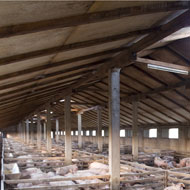Vets ‘more vital than ever’ for disease surveillance

“Vets’ frontline roles must be recognised and supported" - Sean Wensley, BVA president.
Fifteen years on from the devastating foot and mouth disease outbreak, vets are ‘more vital than ever’ for disease surveillance, say the BVA.
First confirmed in an abattoir on the 19 February 2001, the foot and mouth disease outbreak involved the slaughter of over six million animals.
The disease had disastrous emotional and financial impacts on vets, farmers and rural businesses. Vets from across the profession, including those not working with livestock, were called upon to assist with disease control.
Now to mark the anniversary, the BVA is asking the Government to reflect on the vital role of vets and veterinary surveillance. The call comes after Defra was asked to make a further 15 per cent budget cut in last year’s Autumn Statement (November 2015).
“15 years on from the devastation of the 2001 outbreak the UK must remain vigilant for Foot and Mouth Disease, but important lessons learned mean we are now better prepared if another outbreak does occur,” commented BVA president Sean Wensley.
“Today we would have an immediate standstill on livestock movements, improved traceability systems and the possibility of using vaccination as part of the overall control strategy. But we cannot be complacent and the anniversary is an opportunity to reflect on the vital role of vets and veterinary surveillance in protecting the UK from disease.”
Mr Wensley highlights the significant cuts to Defra budgets on veterinary fees for TB testing and other OV services.
He continued: “Vets’ frontline roles must be recognised and supported, backed up by an effective, coordinated system of data capture that will enable us to make the necessary links to detect and control new disease threats.
“We can never be free from the risk of disease, and in recent years the emergence of Schmallenberg and re-emergence of Bluetongue have brought new challenges. It is essential that we have the coordination and capability to identify and diagnose in order to protect our national herd and flock.”



 The latest
The latest